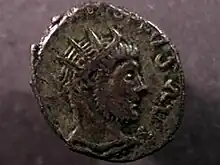| Bonosus | |||||||||
|---|---|---|---|---|---|---|---|---|---|
| Usurper of the Roman Empire | |||||||||
 Antoninianus of Bonosus | |||||||||
| Reign | c. AD 280 (against Probus) | ||||||||
| Died | 280 AD | ||||||||
| Wife |
| ||||||||
| Issue | two sons | ||||||||
| |||||||||
| Father | A Briton | ||||||||
| Mother | A Gaul | ||||||||
Bonosus (died AD 280)[1][2] was a late 3rd-century Roman usurper. He was born in Hispania (Roman Spain) to a British father and Gallic mother. His father—a rhetorician and "teacher of letters"—died when Bonosus was still young but the boy's mother gave him a decent education.[3] He had a distinguished military career with an excellent service record. He rose successively through the ranks and tribuneships but, while he was stationed in charge of the Rhenish fleet c. 280, the Germans managed to set it on fire.[4] Fearful of the consequences, he proclaimed himself Roman emperor at Colonia Agrippina (Cologne) jointly with Proculus. After a protracted struggle, he was defeated by Marcus Aurelius Probus and hanged himself rather than face capture.
Bonosus left behind a wife and two sons who were treated with honor by Probus.[3]
References
- ↑ Hazel, J. (2002). Who's who in the Roman World. Routledge. p. 39. ISBN 9780415291620. Retrieved 10 September 2017.
- ↑ Clinton, H.F. (1853). An Epitome of the Civil and Literary Chronology of Rome and Constantinople: From the Death of Augustus to the Death of Heraclius. University Press. p. 85. Retrieved 10 September 2017.
- 1 2 "Historia Augusta • Lives of Firmus, Saturninus, Proculus and Bonosus". penelope.uchicago.edu.
- ↑ Jacob Burckhardt (1 January 1983). The Age of Constantine the Great. University of California Press. pp. 387–. ISBN 978-0-520-04680-1.